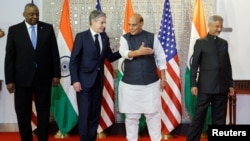“In the face of urgent global challenges, it’s more important than ever that the world’s two largest democracies [the United States and India] exchange views, find common goals, and deliver for our people,” declared Defense Secretary Lloyd Austin at the recent U.S.-India 2+2 Ministerial Dialogue.
“[The United States and India have] made impressive gains in building our major defense partnership over the past year, and that will help us contribute even more together to the cause of peace and stability. We’re integrating our industrial bases, strengthening our interoperability, and sharing cutting-edge technology,” he said.
“Our increasingly strong ties give us all hope for the future of this partnership and for our common efforts toward a more secure world,” said Defense Secretary Austin.
Indeed, Secretary of State Antony Blinken noted that President Joe Biden and Prime Minister Modi Narendra have set out an ambitious agenda to build a stronger and more comprehensive strategic partnership.
“We are promoting a free and open, prosperous, secure, and resilient Indo-Pacific, including by strengthening our partnership through the Quad, with Japan and Australia,” he said. “One significant way we’re doing that is by enhancing maritime domain awareness: sharing commercial satellite data with countries in the region to boost their capacity, for example, to combat illegal fishing, piracy, drug trafficking. We’re also coordinating humanitarian relief and disaster response efforts in the Indo-Pacific.”
On the economic front, the U.S. and India are focused on innovation, noted Secretary Blinken:
“That’s evident in the cooperation on semiconductors and advanced biotechnology; on our unprecedented investments in deploying clean energy at scale in our countries as well as across the region; and our joint research and exploration projects in space.”
With regard to international peace and security, the U.S. and India are working to promote a rules-based order and uphold the principles at the heart of the United Nations Charter: sovereignty, territorial integrity, and independence.
“Finally, we’re deepening the remarkable ties between our people,” said Secretary Blinken.
“If there is one thing we’ve learned over the recent decades, it’s that when Indians and Americans study together, work together, collaborate together, the possibilities for progress are infinite.”
This is a moment in history that requires determination and collaboration, noted Secretary Blinken. “And it only underscores how vital the U.S.-India partnership is – and how important our efforts are to further strengthen it.”






